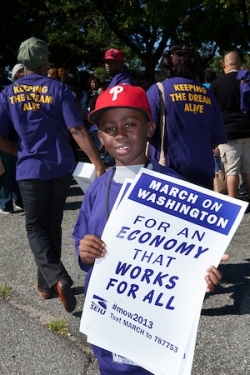
At the Aug 24, 2013 march on Washington, D.C., thousands wore SEIU purple and carried signs demanding higher wages and an economy that works for all. (Belinda Gallegos/SEIU)
WASHINGTON, D.C.—At a rally of some 175,000 people on Saturday to mark the 50th anniversary of Rev. Martin Luther King’s “I have a dream” speech, several leading unions seized the opportunity to strengthen the ties between organized labor and civil rights.
Among the speakers who addressed the crowd from the steps of Lincoln Memorial were top leaders from seven major unions. Large squads of union members were also conspicuous among the marchers with their labor banners and T-shirts in "fighting colors": the orange of the Laborers' International Union of North America (LIUNA), the red of the Communications Workers of America (CWA) and the ubiquitous purple of the Service Employees International Union (SEIU).
“The labor and civil rights communities are in exactly the same place right now in recognizing that we have seen tremendous advances on the legal side of civil rights—Obama is our first African-American president after all—but we are still very, very far from Dr. King’s dream of economic fairness and security,” says David Cox, president of the 300,000-member American Federation of Government Employees (AFGE), which helped sponsor the march. “As far I am concerned, civil rights and labor rights are the same thing."
Two of the most prominent unions at the march were the American Federation of State, County and Municipal Employees (AFSCME) and the SEIU. Each chartered scores of buses to bring in members from nearby states, together contributing an estimated 12,000 marchers to the throngs.
The American Federation of Teachers (AFT), along with its New York-based affiliate United Federation of Teachers (UFT), also had a significant presence. AFT President Randi Weingarten was a speaker, as was UFT President Michael Mulgrew. Other speakers from the labor movement included AFSCME’s Lee Saunders, SEIU’s Mary Kay Henry, 1199SEIU’s George Gresham, AFGE’s Cox, Dennis Van Roekel of the National Education Association (NEA) and AFL-CIO Executive Vice President Arlene Holt Baker.
Unions were well organized ahead of the event, with staff members from almost two dozen labor organizations meeting in Washington, D.C. to coordinate logistics and related matters, says AFSCME spokesman Chris Fleming. The meetings began months ago, and the intent was clear from the beginning that labor wanted to stand out at the August 24 march, he says. Some 17 unions made contributions of $50,000 each to help cover the expenses of the principal organizing committee, says AFGE’s Cox.
Some of the unions involved—such as the AFT, AFSCME, 1199SEIU, and the United Auto Workers (UAW)—wanted to reaffirm ties to the civil rights movement that reach back to the era of Dr. King. The 1199 SEIU (also known as United Health Care Workers East) chartered some 50 buses to bring in about 3,000 members from across the Northeast, including the union's home base, New York City. On one bus from Baltimore, 1199 members and guests watched a video that included a vintage 1960s recording of Dr. King speaking to 1199 members, thanking them for their support and calling the healthcare local his “favorite union.”
AFGE’s Cox tells Working In These Times that he thinks it is only proper that union’s should put in extra effort to honor Dr. King and help propel the civil rights movement forward. “Dr. King did a lot for unions. He is one of the most respected figures in American history, and when people discover that he was a union supporter, and that he fought the same battles for economic justice that we are fighting today, it means a lot.”
In a statement today marking the actual anniversary of the August 28, 1963 march, AFL-CIO President Richard Trumka vowed to keep fighting for economic justice, "Today we rededicate ourselves to the dream of economic equality that so many marched for a half century ago. We will work with those who strive for prosperity for all in this great country—regardless of race, ethnicity, gender, sexual orientation or place of birth."
AFSCME, the Communications Workers of America and the United Auto Workers are web sponsors of In These Times.

